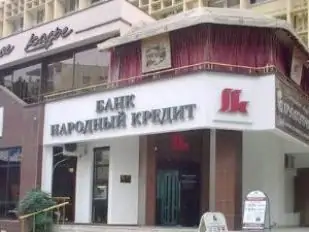2026 Author: Howard Calhoun | [email protected]. Last modified: 2025-01-24 13:10:47
Bank "People's Credit", whose problems reached their peak in 2014, began its existence in 1993. Its first name "Sharq" was changed to "People's Credit" already in 2000. Back in 2008, the financial institution activated the procedure for changing the legal form. The limited liability company was modernized into a joint-stock company in 2009. Already in December 2010, the People's Credit Bank, which had previously been extremely positive reviews, acquired a 25% stake in the Bank of Khakassia. A little later, the number of shares was increased to 76%. By 2011, the license of the financial institution of Khakassia was canceled in full in connection with the merger. Bank "People's Credit", which began to have problems due to low liquidity, was controlled by the Antonov family.

Brilliant past
The bank worked under the license of the Central Bank and was a partner of Moscow. The financial institution was a member of the Association of Russian Banks and a member of the Deposit Insurance Structure. Officially registered authorized capitalenterprises was equal to 1.8 billion rubles. The amount of equity capital was equal to 4.2 billion dollars. The Institute had the title of associate member of the international payment systems VISA Inc. and Mastercard WW. Previously, the rating agency always confirmed the solvency of the institution and classified it as category A in accordance with the national scale.
Just two years before reports began to surface that Narodny Kredit Bank was closing, the organization was a Financial Olympus award winner. The structure of the regional network included 9 main branches and about 35 additional offices. There were times in the history of the institute when it did not even fight for a tender from the state. A tight lending policy at the best of times made it possible to achieve colossal liquidity.
What happened to the bank lately
In the last year, the financial institution worked according to the instructions of the Central Bank, which limited the attraction of deposits from individuals. This order was received in July 2013. Also, in addition to restrictions, the Central Bank of the Russian Federation strongly recommended that all reserves be activated in order to fulfill obligations to depositors. Attention was drawn to the fact that the financial institution itself had never pursued an aggressive policy of attracting deposits. Such measures were taken as a result of the institution's low liquidity.
First signals for trouble

The first failure in the work was due to the fact that the bank "People's Credit" began to issue deposits outside the regulations. Whendepositors began to come for their deposits, they were informed about the daily limit of the institute in the amount of 25 thousand rubles. People were unable to get their hands on all their contributions in one day. I had to go for weeks. Nevertheless, in comparison with other financial institutions that refused to make payments at all, on the eve of bankruptcy, the People's Credit Bank, reviews of which always had a positive connotation, almost fully fulfilled its obligations. Despite the crisis situation, the call center employees consistently answered all questions and provided each client with comprehensive information. In order to avoid material collapses, bank employees constantly notified customers that some payments were suspended, and most of the accounts were not serviced.
Attempts to fix the situation

In an attempt to rectify the situation, Narodny Kredit Bank OJSC is trying to increase liquidity by lowering interest rates on loans. The “people's” program has become incredibly accessible. In the presence of collateral or a guarantor, the interest rate on loans up to one year was only 16% per annum. With a loan duration of one to three years, the interest rate would be 17% per annum. With a loan duration of more than three years, the rate on it was set at 18%. Loans were also available to clients who had neither collateral nor a guarantor. However, in this case, the interest rate rose to 18%. With a partnership period of 1 to 3 years, the interest rate couldbe 19% per annum. If the client decided to take loans for a period of five years, the interest on the loan could be 20%. The offer was valid in all branches, including in such a city as Abakan. Bank "People's Credit" did not save even such a desperate decision: the liquidity situation has not changed.
On what was the decision to liquidate the license based?
The decision to liquidate the license was made based on the reports of the new administration. The information indicated that the bank "People's Credit" is experiencing far from small problems due to a decrease in liquidity to 50%, and the instant liquidity ratio was about 15%. The financial institution did not apply for government assistance due to the fact that at that time negotiations were underway with investors who intended to make a contribution of $100 million.

Beginning of the end
After the NBU received messages from the clients of Bank Narodny Kredit about the impossibility of fulfilling its obligations, a temporary administration was appointed to the financial institution. Beginning October 1, 2014, the interim administration conducted a financial analysis of the situation. In fact, a complete loss of personal capital by the administration was recorded. It was decided that it was impossible to restore the solvency of the structure, and any injections from the state would not make sense. The results of the assessment of the situation by the provisional administration became a powerful reason for the termination of the activities of such a financial institution as the People's Credit Bank. The license is revoked only when the institution is no longer able, even with the financial support of the government, to fulfill all its obligations to depositors and creditors within a year. The circumstances were exactly in line with the law.
The work went downhill

Immediately after the brilliant liquidity indicators, the bank "People's Credit" began to experience far from small problems, despite the conservative activity, which was expressed in servicing projects in the housing and communal services sector. Loans to individuals accounted for only 3% of the loan portfolio, which dominated the assets with a share of 70%. The funds of individuals accounted for only 23% of liabilities. Residual funds on corporate customer accounts amounted to only 22% of capital. Shares and bills of domestic banks accounted for only 19% of net assets. On the interbank market, in most situations, the institution acted as a donor. With a high degree of concentration of assets and liabilities, the activity of the enterprise had low profitability.
Decline in stats

According to the statistics of the National Rating Agency, the bank "People's Credit", whose license is being revoked due to low liquidity, in 2010 received a net profit of 20.9 million rubles. In the previous year, this figure was significantly higher and amounted to 107.2 million rubles. This situation lowered the bank to 149th position in the rating and attracted attentionDeposit insurance agencies. The decrease in indicators was observed in all branches and small branches, and the city of Abakan was no exception. Bank "People's Credit" began to lose ground, although outwardly nothing foreshadowed trouble.
Rational conclusion of the story

Bank "People's Credit" closed for a reason. In addition to low liquidity, the interim administration managed to find out that the price of the financial institution's assets is no more than 14.121 million rubles. As for liabilities to depositors and creditors, they amount to about 16,854.8 million rubles. The reason for this discrepancy is hidden in the issuance of pre-performing loans, the amount of which amounted to 10.2 billion rubles. Moreover, the fact of buying illiquid bills of exchange in the amount of 1.8 billion rubles from companies whose addresses indicated in the documents do not correspond to reality was recorded. There was an alienation of the property of a financial institution in the amount of 0.2 billion rubles. Information was received from the regulator that the management was conducting criminally punishable operations. The result of such manipulations is more than obvious, and a positive development of events should not have been expected. Despite the fact that the majority of depositors partially returned their savings, there are still a fairly large number of those whose losses will be compensated by the insurance agency in the mode established by the regulations.
Recommended:
Closing an LLC in the absence of activity: features and procedures

Closing an LLC in the absence of activity: ways to liquidate an enterprise, depending on the circumstances and conditions, how exactly the procedure is carried out and how long it takes
Social workers are people who take care of vulnerable people

Social workers are professionals who provide assistance and support to some vulnerable or completely vulnerable segments of the population. These categories may include such citizens: pensioners, lonely old people, the disabled, refugees, children from dysfunctional families, orphans or refuseniks
"Zlatobank": reviews. Is Zlatobank closing?

"Zlatobank", negative reviews of which could be found in connection with liquidity problems already in the early autumn of 2014, was officially declared insolvent on February 13, 2015 in accordance with the official decision of the NBU
A settlement account is Opening a settlement account. IP account. Closing a current account

Settlement account - what is it? Why is it needed? How to get a savings bank account? What documents need to be submitted to the bank? What are the features of opening, servicing and closing accounts for individual entrepreneurs and LLCs? How to decrypt bank account number?
Bank "Finance and Credit": problems. Bank customer reviews

Bank "Finance and Credit" today has serious problems associated with the lack of funds to pay deposits. The management of the structure promises to rectify the situation and fulfill all obligations, despite the risk of default

